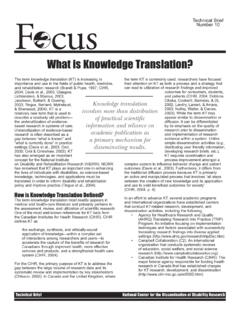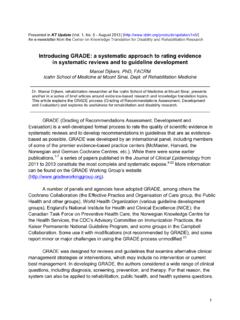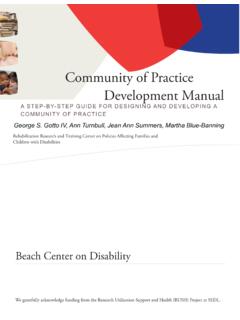Transcription of What is a Scoping Review? - KTDRR Center
1 Published in KT Update (Vol. 4, No. 1 December 2015) [ ] An e-newsletter from the Center on Knowledge Translation for Disability and Rehabilitation research what is a Scoping review ? Marcel Dijkers, PhD, FACRM Icahn School of Medicine at Mount Sinai Department of Rehabilitation Medicine In scanning abstracts resulting from a CINAHL search or in leafing through the table of contents of a hardcopy journal you may have come across the term " Scoping review ", and wondered what it is and how it differs from a systematic review . Alternative terms being used are Scoping study, Scoping project, Scoping exercise, Scoping report, Scoping method, Scoping exercise method, as well as literature mapping, mapping of research , evidence mapping, systematic mapping, literature review , and rapid review (Colquhoun et al., 2014; Pham et al., 2014). We would need to do a careful review of the papers in question to make sure all these various attempts at knowledge synthesis are Scoping reviews if we could come to consensus as to what a Scoping review is.
2 It certainly is a new enough animal that in their " Scoping review of Scoping reviews" Pham et al. (2014) reported that 63% of authors of 344 papers found it necessary to describe what they meant by a " Scoping review " (or whatever other Scoping term they used). Our first indication that a Scoping review still is a "rare bird," or worse, a chameleon, might be that one could hardly imagine systematic review authors feeling obliged to define the term "systematic review ." The Scoping review as it exists today may have first been named by Mays, Roberts and Popay (2001). They wrote that Scoping reviews "aim to map rapidly the key concepts underpinning a research area and the main sources and types of evidence available, and can be undertaken as stand- alone projects in their own right, especially where an area is complex or has not been reviewed comprehensively before" [p.]
3 194, emphasis in original.] However, most authors of Scoping types of reviews claim that directly or indirectly their methodology is derived from a paper by Arksey and O Malley (2005). These authors wrote in this key paper: So what might we consider to be the main differences between a systematic review and a Scoping study? First, a systematic review might typically focus on a well- defined question where appropriate study designs can be identified in advance, whilst a Scoping study tends to address broader topics where many different study designs might be applicable. Second, the systematic review aims to provide answers to questions from a relatively narrow range of quality assessed studies, whilst a Scoping study is less likely to seek to address very specific research questions nor, consequently, to assess the quality of included studies (p. 20).
4 That seems to settle the matter, but other authors have described a similar enterprise as being a literature mapping, and of the canonical five steps in doing a Scoping review described (prescribed?) by Arksey and O Malley and outlined below most authors omit the last one, which Arksey and O Malley indeed call an optional stage. Plus: some authors apply the term Scoping review to a systematic exploration of which concepts and terms are used in what manner in a particular domain, rather than to the creation of an inventory of research findings. There are even This issue of KT Update presents another in a series of brief articles by Dr. Marcel Dijkers. This article introduces and explains Scoping reviews. Published in KT Update (Vol. 4, No. 1 December 2015) [ ] An e-newsletter from the Center on Knowledge Translation for Disability and Rehabilitation research 2 those who define what most researchers might call primary research , collecting the opinions of a sample of experts, as a Scoping review .
5 There is plenty of confusion. Let's start with what Arksey and O Malley (2005) stated as being the steps in doing a Scoping review : 1. Identify the research questions: what domain needs to be explored? 2. Find the relevant studies, through the usual means: electronic databases, reference lists (ancestor searching), websites of organizations, conference proceedings, etc. 3. Select the studies that are relevant to the question(s) 4. Chart the data, the information on and from the relevant studies 5. Collate, summarize and report the results 6. (Optional) consult stakeholders (clinicians, patients and families, policy makers, or whatever is the appropriate group) to get more references, provide insights on what the literature fails to highlight, etc. Arksey and O Malley emphasize that this is not a linear process (as typically dictated by the protocol for a systematic review ) but a back-and-forth between early finds and new insights, and changes in the search terms and even the questions.
6 They do emphasize that because a Scoping review goes wide (although maybe not deep), Mays et al.'s rapid may not be applicable. Other methodologists have distinguished various ways of doing steps 4 and 5, with Schmucker, Motschall, Antes and Meerpohl (2013, p. 1391) claiming that evidence mapping limits itself to tabular displays of the evidence found, while Scoping reviews also summarize the search results "descriptively narratively." If we follow their lead, we may have the rough progression depicted in Table 1 below. Table 1. A possible ordering of knowledge-synthesis methodologies Term Steps Involved 1 Narrative review review of literature that is unsystematically searched and minimally extracted to answer a broad question that may be vaguely stated. 1 2 Evidence Mapping Adds: explicit questions, systematic search for evidence, and tabular summaries of the nature and findings of the studies.
7 3 Scoping review Adds: a narrative integration of the relevant evidence. 4 Systematic review Uses a narrow question, adds: evaluation of the quality of the evidence, and recommendations based on a qualitative synthesis of all the evidence or only the high-quality evidence. 5 Meta-Analysis Adds: a quantitative synthesis of the evidence based on statistical pooling of the findings of studies selected. 1 Narrative reviews do not address a broad question by definition, but it would seem many, if not most, do. Published in KT Update (Vol. 4, No. 1 December 2015) [ ] An e-newsletter from the Center on Knowledge Translation for Disability and Rehabilitation research 3 However, it must be admitted that while the term evidence mapping exists (with as prominent protagonists Bragge et al. (2011), who have focused on evidence relevant to treatment and rehabilitation of spinal cord injury and traumatic brain injury), most authors who have written about the methodology of Scoping reviews do not make a distinction based on how the literature found is presented.
8 On the other hand, Arksey and O Malley (2005, p. 21) give "four common reasons why a Scoping review might be undertaken," of which the first one is "to examine the extent, range and nature of research activity; this type of rapid review might not describe research findings in any detail but is a useful way of mapping fields of study where it is difficult to visualize the range of material that might be available." The second common reason is determining whether a systematic review is feasible and of value. The third and fourth common reasons seem to describe Scoping reviews that are not exploratory or preparatory, but done in their own right: "summarizing and disseminating research findings to policy makers, practitioners and consumers" (#3) and identifying gaps in the existing evidence base followed by conclusions as to the overall state of the research activity in a particular area (#4).
9 In their review of " Scoping studies" that had been commissioned by the United Kingdom's Service Delivery and Organisation research Programme, an office located within the National Institute of Health research , Anderson, Allen, Peckham and Goodwin (2008, p. 3) stress that the " Scoping exercise" "may or may not entail conceptual mapping, the mapping of policy documents and consultations with stakeholders, as well as mapping the literature." With conceptual mapping they mean exploring the terminology being used relevant to a particular topic: key terms, supplemental terms, etc. Policy mapping is collecting all the relevant policy documents from government bodies and non-governmental entities such as professional organizations. These two may be typical of how Scoping reviews are seen in the United Kingdom, or by governmental organizations with responsibility for a research agenda or a research implementation agenda.
10 Arksey and O Malley (2005) emphasize that a Scoping review , however much it may resemble a systematic review , does not involve an assessment of the quality of the primary studies, with which most authors who have written about the methodology of Scoping reviews (Davis, Drey & Gould, 2009; Levac, Colquhoun & O Brien, 2010) agree, although Whittemore, Chao, Jang, Minges and Park (2014) state that there are "no well-established criteria" for a Scoping review to have or not have quality appraisal of the primary studies. Daudt, van Mossel, & Scott (2013) do suggest that Scoping reviews should use some form of quality assessment. In the most recent attempt to create some clarity as to what a Scoping review is, Colquhoun et al. (2014) suggest that a Scoping review or study is a "form of knowledge synthesis that addresses an exploratory research question aimed at mapping key concepts, types of evidence, and gaps in research related to a defined area or field by systematically searching, selecting and synthesizing existing knowledge.










